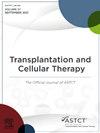Effects of Consolidation Therapy With Autologous Hematopoietic Stem Cell Transplantation After BCMA-CAR T-Cell Therapy on the Survival of Patients With Relapsed or Refractory Multiple Myeloma
IF 3.6
3区 医学
Q2 HEMATOLOGY
引用次数: 0
Abstract
Despite the success of chimeric antigen receptor (CAR) T-cell therapy for relapsed or refractory multiple myeloma (RRMM), failure after CAR T-cell therapy remains an unmet medical need. An effective consolidation therapy after CAR T-cell therapy may improve the prognosis of RRMM. To investigate the effects of consolidation therapy with autologous hematopoietic stem cell transplantation (AHCT) after B-cell maturation antigen (BCMA)-targeted CAR T-cell therapy on the prognosis of RRMM patients. This retrospective study included 39 RRMM patients who received BCMA-targeted CAR T-cell therapy. Basic clinical, therapy, and outcome data were collected, and factors associated with survival were analyzed. Among the 39 RRMM patients included in the study, 15 had high-risk cytogenetics and 11 had extramedullary disease (EMD). All 39 patients reached peak CAR T-cell expansion within 28 days after infusion. Twenty-six patients developed cytokine release syndrome, including 12 grade 1 and 14 grade 2 cases. Survival analysis revealed that high-risk cytogenetics, high tumor load (International Staging System [ISS] stage III), and EMD were negatively associated with progression-free survival (PFS) and overall survival (OS). Thirteen patients received consolidation AHCT therapy 50-276 days after CAR T-cell therapy, with a median interval of 92 days. No serious complications occurred after consolidation AHCT. Survival analysis showed that consolidation AHCT effectively improved OS and PFS over maintenance chemotherapy. Moreover, Cox regression analysis identified low tumor load (ISS stage I/II) and consolidation AHCT as independent predictors of superior PFS and OS and high-risk cytogenetics as an independent risk factor for poor PFS. Consolidation AHCT after CAR T-cell therapy in RRMM patients can improve patient survival.
BCMA-CAR T细胞疗法后进行自体造血干细胞移植巩固治疗对复发或难治性多发性骨髓瘤患者生存期的影响。
背景:尽管嵌合抗原受体(CAR)T细胞疗法在治疗复发或难治性多发性骨髓瘤(RRMM)方面取得了成功,但CAR T细胞疗法后的失败仍是一项尚未满足的医疗需求。在CAR T细胞治疗后进行有效的巩固治疗可改善RRMM的预后:目的:研究B细胞成熟抗原(BCMA)靶向CAR T细胞治疗后进行自体造血干细胞移植(AHCT)巩固治疗对RRMM患者预后的影响:这项回顾性研究纳入了39名接受BCMA靶向CAR T细胞治疗的RRMM患者。收集了基本的临床、治疗和预后数据,并分析了与生存相关的因素:在纳入研究的39例RRMM患者中,15例有高风险细胞遗传学,11例有髓外疾病(EMD)。所有39名患者均在输注后28天内达到CAR T细胞扩增峰值。26名患者出现了细胞因子释放综合征,包括12例1级病例和14例2级病例。生存分析显示,高危细胞遗传学、高肿瘤负荷(国际分期系统[ISS]III期)和EMD与无进展生存期(PFS)和总生存期(OS)呈负相关。13名患者在CAR T细胞治疗后50-276天接受了AHCT巩固治疗,中位间隔为92天。巩固AHCT治疗后未出现严重并发症。生存期分析表明,与维持化疗相比,巩固AHCT能有效改善OS和PFS。此外,Cox回归分析发现,低肿瘤负荷(ISS I/II期)和巩固性AHCT是优越PFS和OS的独立预测因素,而高危细胞遗传学是不良PFS的独立风险因素:结论:RRMM患者接受CAR T细胞治疗后进行AHCT巩固治疗可提高患者生存率。
本文章由计算机程序翻译,如有差异,请以英文原文为准。
求助全文
约1分钟内获得全文
求助全文
来源期刊

Transplantation and Cellular Therapy
Medicine-Hematology
CiteScore
7.00
自引率
15.60%
发文量
1061
审稿时长
51 days
 求助内容:
求助内容: 应助结果提醒方式:
应助结果提醒方式:


